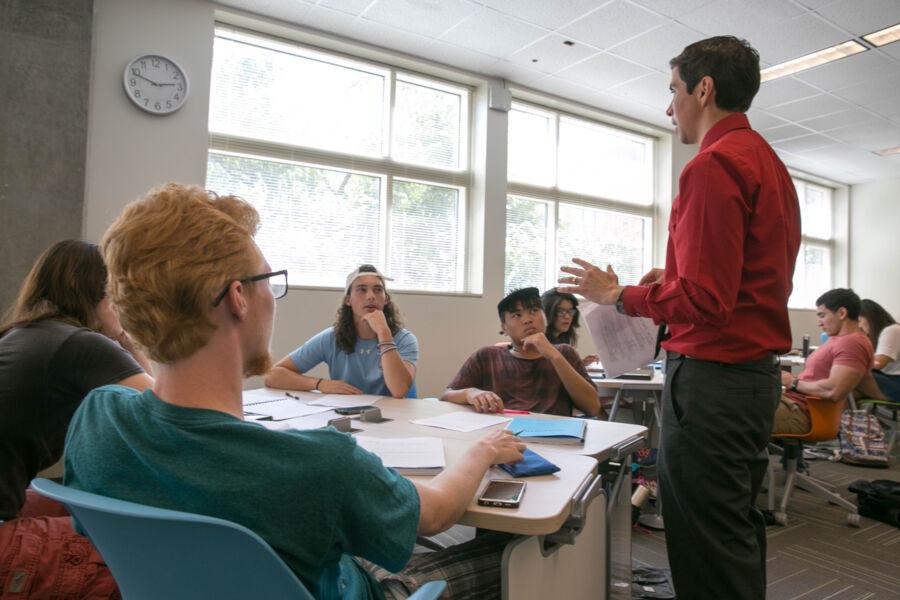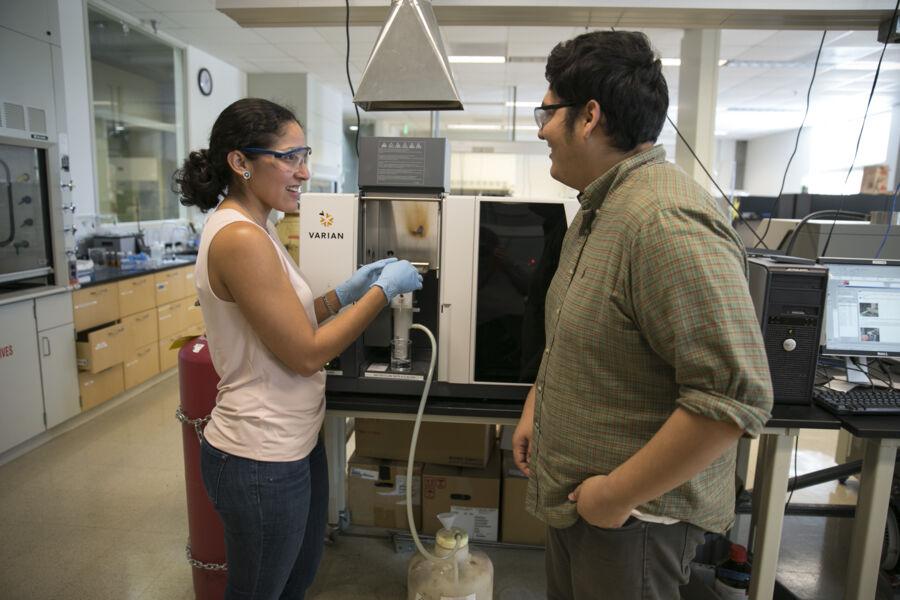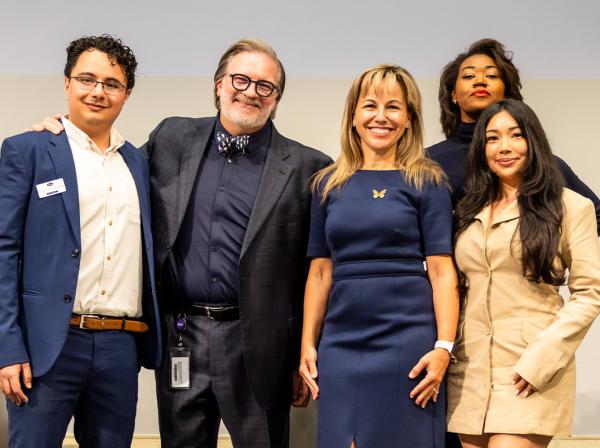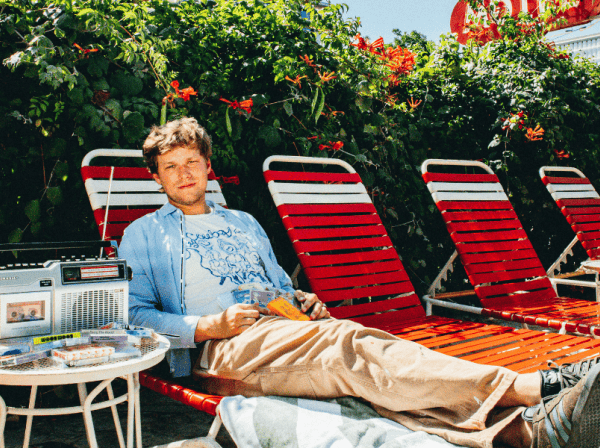How to Prepare for a Career in the Health Sciences
If you’re searching for a profession where you can help people (or animals) improve their health, St. Edward’s is an ideal place to start. A liberal arts degree that teaches you how to think prepares you for a career as a doctor, dentist, physician assistant, pharmacist, optometrist, physical therapist, occupational therapist or veterinarian.
Each program has different requirements for professional school, but at St. Edward’s, staff in an office specializing in the health professions will help you understand how to meet them. And throughout your college years, you’ll have opportunities to volunteer, job-shadow and talk with people in your dream career, while building an application that will stand out from the pack.
You’ll Get Personal Attention and Help Every Step of the Way
If you’re considering one of these careers, you’ll have the support of Jason De La Rosa, associate director of pre-health professions at St. Edward’s. That support begins even before your first class: During freshman orientation, you’ll have a one-on-one meeting to talk about your goals and what it will take to reach them. You’ll meet regularly throughout your college years to make sure you’re progressing and finding the right program for you.
And because classes are small at St. Edward’s, you’ll also get personal attention from your professors. That’s important for building relationships that lead to research opportunities and strong recommendation letters. “At St. Edward’s I had opportunities I would have had to compete for in a big institution — like research, or even mentorship, where you built close relationships with people who got to know your strengths and could help guide you,” says Margaret Whitney ’07, who earned her medical degree from the University of Texas Health Science Center at San Antonio and is now an ob-gyn. “There’s competition anywhere, but I felt like everything was much more within my reach at St. Edward’s.”

You’ll Have Opportunities to Develop the People Skills and Critical Thinking your Grad Program is Looking For
Health sciences schools aren’t just looking for well-rounded students; they’re looking for well-rounded people. Research, international travel, volunteering and job-shadowing stand out because they show you’re curious and willing to get out of your comfort zone. And it’s easy to get plugged in to those experiences at St. Edward’s, where your advisor or professor can point you in the right direction.
Whitney, who also teaches at the University of Texas at Austin Dell Medical School, says medical schools want to see evidence that applicants are caring and thoughtful in addition to smart. “My experience has been that you should demonstrate interest in medicine,” she says, “but what people are looking for also is leadership qualities and altruism — things a small liberal arts school gives you the opportunity to really dive deeply into.”
You Can Major in Any Subject
In the past, you had to major in biology, chemistry or biochemistry to get into a graduate program in the health sciences. That’s not true anymore, says Jason De La Rosa. These days, those programs are looking for candidates who are strong science students, but who also have a grounding in ethics, a service orientation, and the ability to relate to people from all backgrounds.
“All the health professions, because of their shift to a holistic model of application review, are looking for students who are really well rounded in their approach to learning,” De La Rosa says. Liberal arts universities like St. Edward’s give students that edge by designing every degree to include courses in ethics, writing, the arts, and social sciences like psychology — you can’t help but graduate with a holistic approach to learning. And if you decide that you want to major in a field like philosophy or behavioral neuroscience, that’s perfectly fine, as long as you complete the science or kinesiology courses your graduate program requires.
You’ll Take Two Courses to Prepare You for a Health Profession
As a freshman at St. Edward’s, you’ll take First-Year Seminar in Pre-Health Professions, which gives you insight into what life is really like as a doctor, physician’s assistant, or other healthcare practitioner. Local professionals visit the class to share their day-to-day responsibilities, how they handled the college years, and work-life balance. You’ll conduct an informational interview with someone in your field and possibly job-shadow that person.
As a junior or senior, you’ll take Navigating the Health Application Process, where you’ll choose the schools where you want to apply. You’ll put your application together and write your personal statement — up to 10 drafts — with help from De La Rosa. “I will personally review an application with a student every step of the way to make sure there aren’t typos, and to make sure the language they’re using is the language they should be using for a health professional application,” he says. Two students collaborating in a chemistry lab. Two students analyzing samples in the lab.

You’ll Have Your Pick of 30 Events Sponsored By the Health Professions Office Each Year
These include on-campus meetings with representatives from graduate programs, as well as workshops to prepare you for specific aspects of the application process. Plus, St. Edward’s organizes small-group visits to medical, nursing and physical therapy schools.
Your Application Will Include a Letter from An Interdisciplinary Team of Professors
If you’re applying to a medical, dental, veterinary, pharmacy, optometry or physician assistant program, you’ll first apply to the Health Professions Advisory Committee at St. Edward’s. This team, made up of professors in biology, chemistry, behavioral neuroscience, and philosophy and ethics — along with De La Rosa — interviews candidates who’ve met the academic and experiential criteria. The group then writes a letter of evaluation that gives health professions schools a complete picture of your strengths and aptitudes. (Other programs, like physical therapy schools, don’t require this kind of letter.)
You’ll Have the Benefit of Partnerships St. Edward’s Has Built with Other Programs
Academically qualified St. Edward’s students are guaranteed an interview at the Notre Dame of Maryland School of Pharmacy. And up to two St. Edward’s students each year are guaranteed admission to the Furman University Master of Science in Community-Engaged Medicine. The latter program is particularly helpful for students who need to take a gap year to bolster their application by improving their academic record or getting more hands-on experience in healthcare. “It gives them growth experiences so that when they finish, they’ll be a more viable candidate for whatever health-profession program they’re applying to,” De La Rosa explains.


